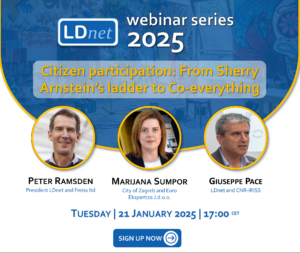This was the first in a new 2025 series of LDnet webinars. It took place online on 21 January 2025 with three main speakers – Peter Ramsden, Marijana Sumpor, Giuseppe Pace – and 45 active participants. Like all LDnet webinars it was free and open to practitioners, researchers and policy administrators.
Urszula Budzich-Tabor, LDnet and AEIDL, opened the meeting and introduced the LDnet webinar series which address the topics of participative approaches to local development and theplace of local development in the EU budget and policies the post-2027 period.
The webinar introduced the topic of participation and explored how to distinguish it from partnership. It revisited the ladder of participation developed by Sherry Arnstein in 1969 after her work on Lyndon Johnson’s model cities programme and went on to look at its strengths and weaknesses as a framework. Practical examples were presented for Naples and Zagreb looking at ways to engage with citizens in very different political and cultural settings. A lively debate followed the presentations.
The summaries of the main presentations are available below and the full video recording of the webinar at the end of this post.
This webinar was planned by Peter ramsden and was organised by Alistair Adam Hernandez and Haris Martinos.
What is participation: the ladder of participation and the concept of co-everything
Peter Ramsden, President LDnet and Freiss ltd
Peter introduced Sherry Arnstein’s ladder of participation. He looked at its origins as a way of analysing the level of “maximum feasible participation” that had been achieved in the 1966 Model Cities programme. He went on to explain with examples the 8 steps on the ladder from manipulation to citizen control. Using the example of Lea View House in Hackney in the 1980s he explored how tenant direct action had led to shared decision making involving architects and council departments, but that this had fallen prey to manipulation when contracts were at stake. He concluded with introducing “co-everything” and emphasised that co-production and co-design rely on end-user participation.
For Peter’s powerpoint presentation click below.
Participatory budgeting in Zagreb
Marijana Sumpor, City of Zagreb and Euro Ekspertiza J.d.o.o.
In Zagreb they launched a participative budgeting pilot project in 2024 covering 4 city districts and are using this to bring city policy making closer to citizens. In the process of participatory budgeting, citizens have a direct influence on the decision-making on the spending of part of the public funds allocated by the city budget, in such a way that they identify challenges in their neighbourhoods, propose project solutions, and participate in the selection of projects to be financed through the voting process.
The main objectives of participatory budgeting are to increase citizen involvement in the decision-making process, increase transparency, identify and solve challenges in city districts, as well as improve the quality of life of all citizens, especially socially vulnerable groups. More information about the participatory budgeting process is avilable HERE.
For Marijana’s powerpoint presentation click below.
Heritage-led Participation Cases from Naples
Giuseppe Pace, LDnet and CNR-IRISS
Participation plays a vital role in fostering sustainable development and democratic citizenship, yet it is not a straightforward solution and often incurs significant costs. Effective participatory processes focus on redistributing expert knowledge, fostering dialogue, and building trust in the integrity of mediators rather than relying solely on expertise or prescriptive solutions. These processes prioritize consent for collaborative debate rather than top-down planning, ensuring shared ownership of outcomes. However, challenges such as power dynamics, co-optation, and underrepresented voices often create ambiguities for participants and observers. The COST Action “Underground4value” (2019–2023), funded by the EU Horizon program, addressed these complexities by promoting Underground Built Heritage (UBH) as a resource for local development. Through a network spanning 35 countries and over 200 members, the initiative developed innovative methodologies—Strategic Stakeholder Dialogue, Transition Management, and Social Practice Theory—to guide local promoters and facilitate iterative, community-led processes.
The Rione Sanità neighbourhood in Naples, rich in cultural and underground heritage, served as a focal point for this initiative. Despite its historical significance and previous regeneration projects, socioeconomic challenges and limited recognition of its assets defined the area as marginalised. The Fontanelle Cemetery living lab was a key effort to promote community-driven heritage valorisation, involving stakeholder mapping, training programs, and strategic dialogue sessions. Initial challenges, such as underestimating the complexity of local dynamics and excluding diverse voices, revealed the need for a more inclusive and transparent participatory approach. Lessons learned led to expanded engagement, integrating cultural, spiritual, and scientific values into the planning process. This culminated in a new partnership agreement between the Municipality of Naples and the Social Cooperative “La Paranza” in October 2023, demonstrating the potential of participatory governance in heritage-led urban development.
For Giuseppe’s powerpoint presentation click below.
For the full video recording of the webinar, click HERE.

Leave a Reply
You must be logged in to post a comment.